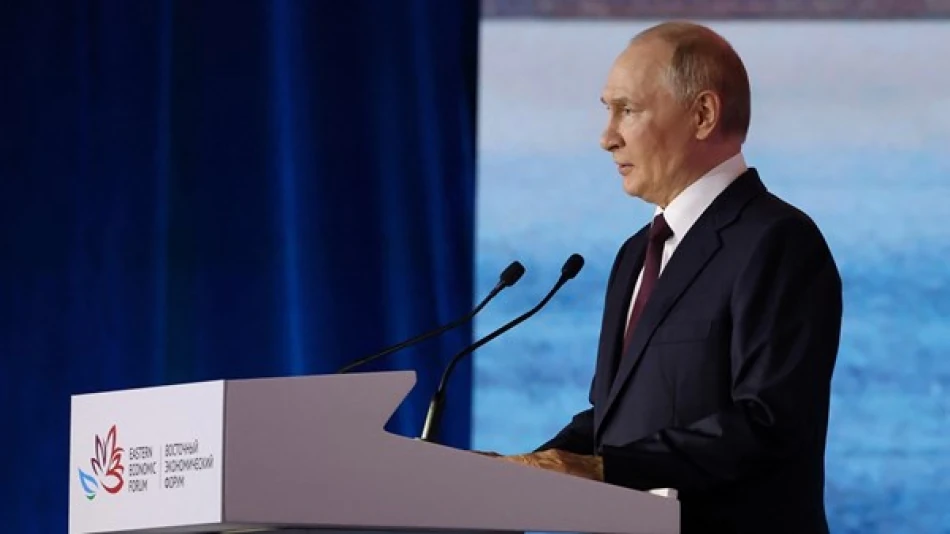
Putin Warns: Russia Will Target Any Military Force Deployed in Ukraine
Putin Threatens Western Forces as Europe Pledges Military Support for Ukraine
Russian President Vladimir Putin issued stark warnings Friday that any Western forces deployed in Ukraine would become "legitimate targets" for Russian military action, just one day after 26 nations—primarily European—committed to comprehensive military support for Kyiv. The escalating rhetoric highlights the deepening divide over Ukraine's security guarantees as diplomatic efforts continue behind the scenes, with the involvement of Trump's special envoy signaling potential shifts in U.S. policy.
Europe Steps Forward as America Steps Back
The timing of Thursday's Paris summit reveals Europe's growing urgency to secure Ukraine's future amid uncertainty about continued American support under the Trump administration. Twenty-six countries, overwhelmingly European, pledged military assistance across land, air, and sea domains—a commitment Ukrainian President Volodymyr Zelensky hailed as "concrete progress" after more than three years of conflict.
French President Emmanuel Macron emphasized that security guarantees would activate "the day the conflict stops," whether through ceasefire, truce, or peace treaty. However, Macron provided no specifics about individual country contributions, suggesting the coalition may still be working out operational details.
The Kremlin's Red Lines
Putin's response was swift and uncompromising. Speaking at an economic forum in Vladivostok, he declared that foreign troops deployed in Ukraine—particularly during active combat—would be treated as legitimate military targets. The Russian president's comments reflect Moscow's fundamental opposition to any Western military presence in Ukraine, even in a peacekeeping capacity.
Kremlin spokesperson Dmitry Peskov reinforced this position, telling RIA Novosti that foreign military units "absolutely cannot" provide security guarantees for Ukraine, while insisting Russia must also receive security assurances in any future arrangement.
Trump's Shadow Diplomacy
The involvement of Trump's special envoy Steve Witkoff in portions of the Paris summit, followed by online discussions with the president-elect, suggests parallel diplomatic tracks are already emerging. Ukraine's reliance on what Zelensky termed a U.S. "safety valve mechanism" underscores Kyiv's recognition that European commitments alone may prove insufficient.
The absence of any official statements following the Trump team's consultations indicates these discussions remain preliminary, but their timing suggests the incoming administration is already positioning itself in Ukraine policy debates.
Historical Precedent and Strategic Implications
The European security guarantee model echoes post-World War II arrangements, but faces the unprecedented challenge of operating alongside an active military threat from a nuclear power. Unlike NATO's Article 5 collective defense mechanism, these bilateral commitments lack the institutional framework and automatic triggers that have deterred aggression for decades.
For investors and markets, the European commitment signals potential increased defense spending across the continent, benefiting defense contractors while raising questions about fiscal sustainability. The uncertainty surrounding U.S. policy under Trump adds volatility to both European defense stocks and broader geopolitical risk assessments.
The Security Guarantee Dilemma
Putin's threat exposes the central contradiction in Western security guarantees for Ukraine: how can external forces provide meaningful security assurances against the very power they're meant to deter? Russia's position that it too requires security guarantees suggests Moscow views any Western military presence in Ukraine as inherently threatening, regardless of its stated defensive purpose.
This dynamic mirrors Cold War standoffs but lacks the established rules and communication channels that previously prevented escalation. The European coalition's success will likely depend on crafting arrangements that provide genuine deterrence without triggering the Russian response Putin has now explicitly threatened.
Most Viewed News

 Layla Al Mansoori
Layla Al Mansoori






